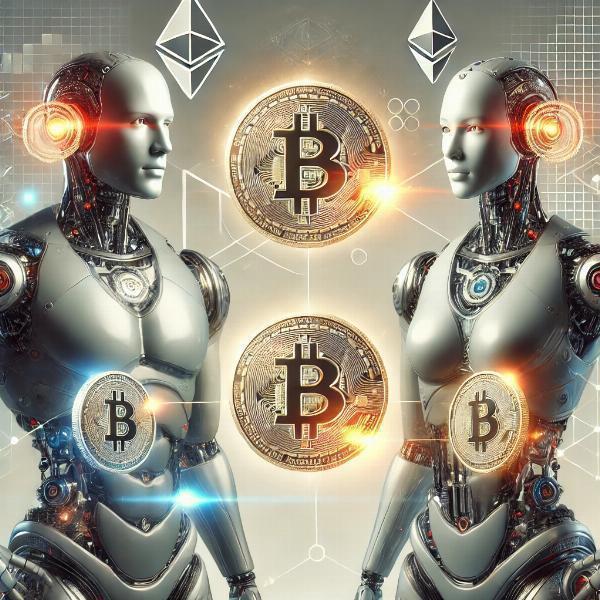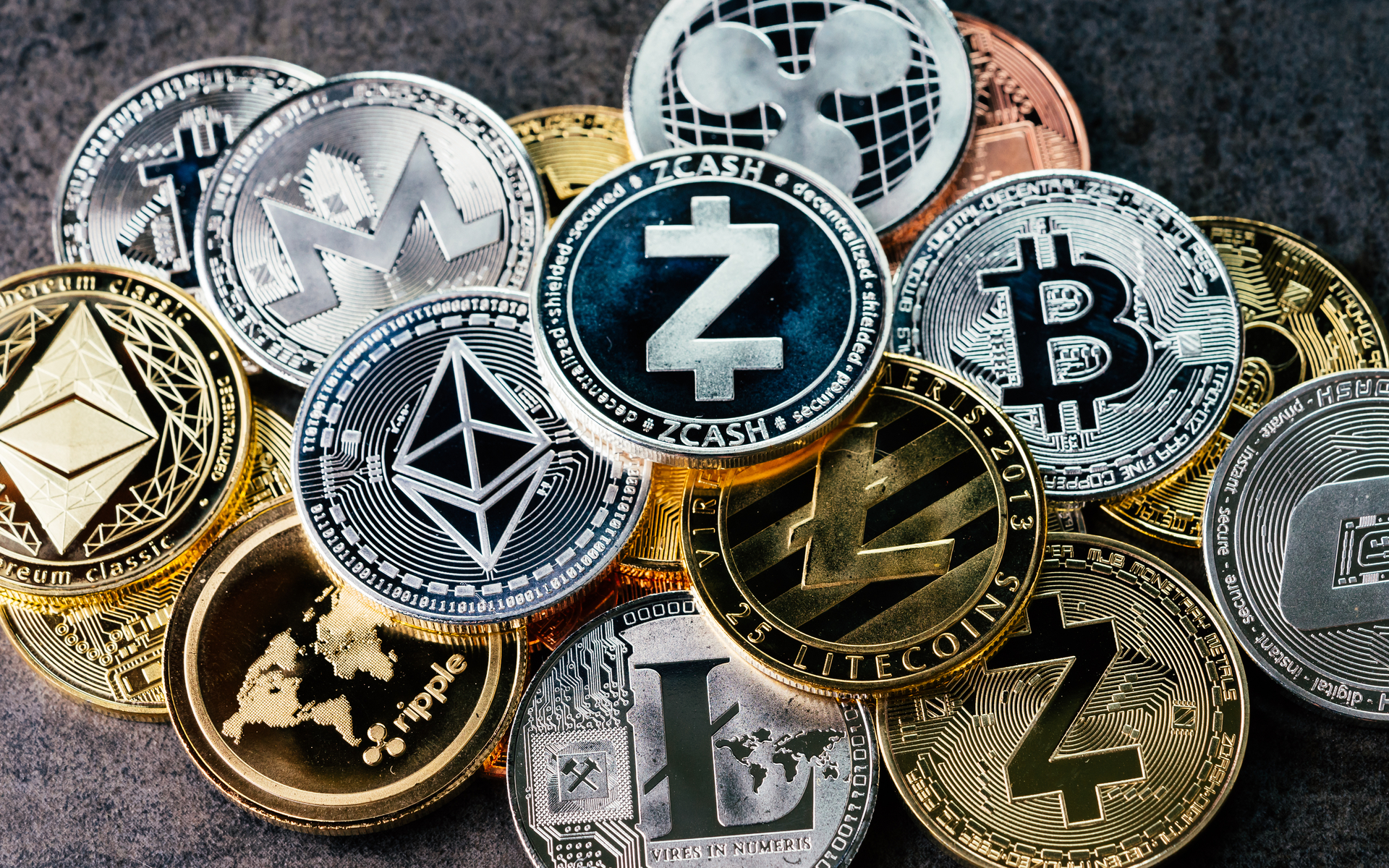How Crypto & AI Can Work Together: Exploring the Possibilities

Cryptocurrencies and artificial intelligence (AI) are two of the most game-changing technologies today. Cryptocurrencies, like Bitcoin and Ethereum, have transformed how we think about money by offering secure, transparent, and decentralized transactions worldwide. On the other hand, AI is revolutionizing industries by making processes more efficient and enabling smarter, data-driven decisions.
✍️ Want to know how ordinary people use Bitcoin or Ethereum daily? Read our practical cryptocurrency article for case studies on payments, remittances, and decentralized finance.
As of 2024, the global cryptocurrency market is valued at around $51.5 billion, with expectations for continued growth. Similarly, the AI market is projected to reach an incredible $1.59 trillion by 2030, reflecting its expanding influence across various sectors (Grand View Research). The combination of these two technologies opens up exciting possibilities, such as more secure blockchain systems and AI-powered financial products. Let’s explore how crypto and AI can work together to create innovative solutions in the digital world.
Blockchain development plays a crucial role in securely and efficiently integrating these technologies.
Understanding the Basics: Cryptocurrency and AI
What is Cryptocurrency?
Cryptocurrency is a type of digital currency that uses cryptography to secure transactions. Unlike traditional currencies, which are controlled by governments, cryptocurrencies operate on decentralized networks using blockchain technology. A blockchain is like a digital ledger that records all transactions across a network, ensuring transparency and security.
Bitcoin, launched in 2009, was the first cryptocurrency and remains the most popular. Bitcoin has a current market capitalization of approximately $528 billion (CoinMarketCap). It introduced the idea of a decentralized currency that can be transferred directly between people without needing a bank. Ethereum, another popular cryptocurrency, has a market cap of about $200 billion (CoinMarketCap), and it expands on Bitcoin’s capabilities by allowing smart contracts—self-executing contracts with the terms written into code, enabling more complex transactions and applications.
What is Artificial Intelligence (AI)?
Artificial Intelligence (AI) refers to the ability of machines, particularly computers, to perform tasks that typically require human intelligence. These tasks include understanding speech, making decisions, and translating languages. AI systems operate by creating algorithms that allow computers to learn from data and improve their performance over time, even without explicit programming for specific tasks.
AI is already integrated into our daily lives. For example, smart assistants like Siri and Alexa use AI to understand and respond to voice commands, while Netflix’s recommendation system uses AI to suggest movies based on user behavior. The global AI market size was valued at $136.6 billion in 2022 and is expected to grow at a compound annual growth rate (CAGR) of 37.3% from 2023 to 2030 (Grand View Research).
How Crypto and AI Can Collaborate
Enhancing Crypto Security with AI
AI can significantly enhance the security of cryptocurrency transactions. By analyzing vast amounts of transaction data, AI can detect unusual patterns that might indicate fraud or suspicious activities. This capability is vital in the crypto world, where the anonymity and decentralized nature of transactions can make traditional fraud detection methods less effective.
For example, AI-powered systems can monitor transactions in real-time and flag any anomalies, helping prevent hacking or fraud. According to PwC, AI-driven security solutions can reduce the cost of fraud detection by up to 30% while increasing detection accuracy.
Improving Smart Contracts with AI
Smart contracts are powerful tools for automating transactions, but they can be rigid and difficult to adapt to complex situations. AI can make these contracts more flexible and responsive. For instance, AI can learn from previous transactions and external data to improve how smart contracts function, reducing errors and disputes.
AI-enhanced smart contracts can autonomously optimize contract terms and conditions based on real-time data, which can lead to a 20-30% increase in efficiency for decentralized applications (DApps), according to IBM.
Creating Decentralized AI with Blockchain
Combining AI and blockchain technology can lead to decentralized AI systems, where decision-making is distributed across a network rather than being controlled by a single entity. This enhances transparency and trust since all decisions are recorded on a secure, unchangeable ledger. Blockchain also aids in securely distributing AI models and data, ensuring fair access for all participants in the network.
For example, the Fetch.ai project is working on creating a decentralized digital economy by combining AI and blockchain, enabling devices to autonomously perform tasks such as optimizing energy grids or trading digital assets.
AI-Powered Crypto Trading
AI is becoming increasingly important in cryptocurrency trading. By analyzing large datasets, such as historical prices and market sentiment, AI can identify patterns and generate trading signals. This helps traders make better decisions, reduce human error, and potentially increase profits.
AI-powered trading bots, for instance, can execute trades at speeds much faster than any human, capitalizing on small market fluctuations to optimize outcomes. AI-driven trading systems have been shown to improve portfolio returns by 10-20% compared to traditional methods (J.P. Morgan).
Real-World Examples of AI and Crypto Working Together
Finance: AI and Crypto Innovation
In finance, AI and cryptocurrencies are driving significant innovations. AI improves trading algorithms that manage crypto assets, making predictions and executing trades based on real-time data. Companies like Numerai are using AI to build hedge funds that leverage encrypted data submitted by data scientists to optimize investment strategies.
AI is also enhancing credit scoring models for decentralized finance (DeFi) platforms. By analyzing non-traditional data sources, AI can assess the creditworthiness of people who may not have access to traditional banking services, expanding financial inclusion. This approach can potentially reduce default rates by 20-40% (Deloitte).
Healthcare: Combining AI and Blockchain
In healthcare, AI and blockchain are being combined to manage and protect patient data more effectively. Blockchain creates a secure, unchangeable record of patient information, while AI analyzes this data to generate insights that can improve patient outcomes.
For example, MedRec uses blockchain to create decentralized patient records, which AI can then analyze to improve diagnosis and treatment plans.
Supply Chain Management: AI and Blockchain Synergy
AI and blockchain are also transforming supply chain management. AI helps optimize supply chains by predicting demand, optimizing routes, and managing inventory. When combined with blockchain’s transparent and tamper-proof records, the entire supply chain becomes more efficient and reliable.
For example, IBM’s Food Trust network uses blockchain to track food products from farm to table, while AI analyzes the data to predict disruptions and optimize logistics.
The Future of Crypto and AI Together
Trends to Watch
The combination of AI and cryptocurrencies is expected to drive several key trends. One major trend is the rise of decentralized autonomous organizations (DAOs) powered by AI. These organizations are run by AI-driven smart contracts, allowing for decentralized decision-making without human intervention.
Another trend is the development of AI-driven personalized financial services. AI can analyze vast amounts of data to create customized financial products and services tailored to individual needs, such as personalized investment portfolios or dynamic insurance policies. This could make financial services more accessible and efficient, especially when combined with blockchain’s transparency and security.
Long-Term Impact
The long-term collaboration between AI and cryptocurrencies has the potential to revolutionize various industries. In finance, we could see the complete automation of trading, lending, and investment management, leading to more efficient and inclusive financial markets. In healthcare, the fusion of AI and blockchain could lead to more personalized and secure medical treatments. And in supply chain management, this combination could create unprecedented levels of efficiency and transparency.
As these technologies continue to evolve together, their combined impact will likely redefine how industries operate, creating a more interconnected, efficient, and secure digital economy.
Note: IndiBlogHub features both user-submitted and editorial content. We do not verify third-party contributions. Read our Disclaimer and Privacy Policyfor details.







